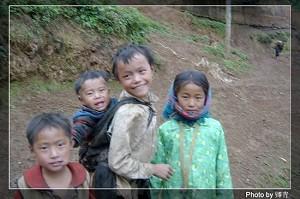CHINA—People of the Yi race make up 93 percent of the population in Butuo County, an autonomous state in the center of Liang Mountain in Sichuan Province in southwest China. Liang Mountain is a cold and high place. There are a dozen different races in Butuo County, but the Yi race predominates.
I took a train to southern China this summer; a trip that took over 30 hours. It’s not easy to describe everything I saw in the mountains. Because language is so limited, I will let the pictures do the talking. The fields are beautiful but barren. At 3,000-meters (1.86 miles) above sea level only potatoes, buckwheat, and oats can grow there.

Villagers from the remote mountains Qing Qing/The Epoch Times
